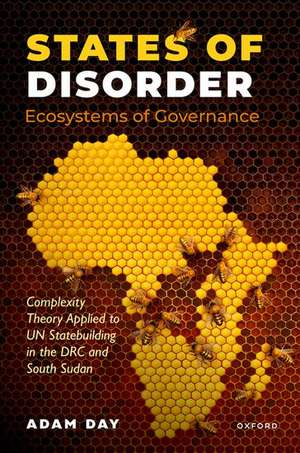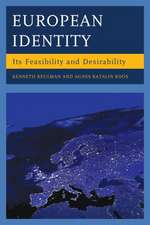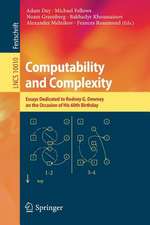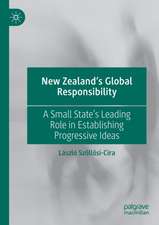States of Disorder, Ecosystems of Governance: Complexity Theory Applied to UN Statebuilding in the DRC and South Sudan
Autor Adam Dayen Limba Engleză Hardback – 21 apr 2022
Preț: 498.81 lei
Preț vechi: 612.58 lei
-19% Nou
Puncte Express: 748
Preț estimativ în valută:
95.45€ • 104.00$ • 80.43£
95.45€ • 104.00$ • 80.43£
Carte disponibilă
Livrare economică 22-28 martie
Preluare comenzi: 021 569.72.76
Specificații
ISBN-13: 9780192863898
ISBN-10: 0192863894
Pagini: 216
Dimensiuni: 162 x 240 x 20 mm
Greutate: 0.51 kg
Editura: OUP OXFORD
Colecția OUP Oxford
Locul publicării:Oxford, United Kingdom
ISBN-10: 0192863894
Pagini: 216
Dimensiuni: 162 x 240 x 20 mm
Greutate: 0.51 kg
Editura: OUP OXFORD
Colecția OUP Oxford
Locul publicării:Oxford, United Kingdom
Recenzii
This book is a welcome contribution to our scholarly understanding ofthe UN's approach to statebuilding …
The United Nations is sent to build peace in some of the hardest conflicts on earth. Adam Day has been in the trenches and draws on years of observations to show how simplistic attempts to build states make the situation worse. But this is no glib critique of international liberalism or predatory states: Day's deft use of complexity theory offers a deep understanding of how systems of governance are ordered and how international interventions could do better if they took the time to understand the relationships on which order is built. Every UN, World Bank, and foreign office staffer should read this crucial book.
A masterwork. This book will fundamentally change your thinking on why the UN too often fails when intervening in conflict zones, and how they must reform their approach to be effective in the current era. Combining empirically-based insights from complexity science on how entrenched systems do and do not change with his lived experience and research in some of the most intractable settings of our time, Adam Day delivers a brilliant treatise and actionable steps. This should be mandatory reading at the UN, as well as in all university courses in international affairs and peace studies. A tour de force!
States of Disorder makes a bold claim: Because systems of governance evolve and adapt over time, United Nations interventions regularly contribute to exclusion and violence. Thankfully, Adam also shows that avoiding such unintended consequences-and helping transform authoritarian states for the better-is possible. His unique insights, born from an innovative use of complexity theory combined with deep first-hand experience, should be required reading for anyone involved in peacebuilding or conflict resolution.
Adam Day offers a healthy critique of the self-serving mantra of interventionists who patronizingly talk of "fragile states" and claim "to extend state authority" but regularly fail. After the Afghan debacle, it is high time to re-visit traditional assumptions, and acknowledge that, as the author reminds us, "there is no disorder on earth; life is constantly re-ordering itself". We just don't see it, and ignore at our own peril the networks and relationships that intervention disrupts.
States of Disorder offers a powerful insider's critique of UN state-building efforts. We've long known that the liberal statehood approach to conflict resolution has run its course. But Adam offers hope: if the UN wishes to exert influence and fulfil the goal of reducing violence, rather than impose external models, it can gradually understand the complex systems of governance and web of relationships at work in societies riven by conflicts and evolve new ways of managing growing levels of violence in many parts of the world.
The book demonstrates that complexity theory can help us see how our multilateral, interconnected and complex world can self-organise in response to changes, and how different models of governance can exist and contribute to overcoming profound challenges in a world where key interconnected and powerful non-state actors wield increasing influence over states.
The United Nations is sent to build peace in some of the hardest conflicts on earth. Adam Day has been in the trenches and draws on years of observations to show how simplistic attempts to build states make the situation worse. But this is no glib critique of international liberalism or predatory states: Day's deft use of complexity theory offers a deep understanding of how systems of governance are ordered and how international interventions could do better if they took the time to understand the relationships on which order is built. Every UN, World Bank, and foreign office staffer should read this crucial book.
A masterwork. This book will fundamentally change your thinking on why the UN too often fails when intervening in conflict zones, and how they must reform their approach to be effective in the current era. Combining empirically-based insights from complexity science on how entrenched systems do and do not change with his lived experience and research in some of the most intractable settings of our time, Adam Day delivers a brilliant treatise and actionable steps. This should be mandatory reading at the UN, as well as in all university courses in international affairs and peace studies. A tour de force!
States of Disorder makes a bold claim: Because systems of governance evolve and adapt over time, United Nations interventions regularly contribute to exclusion and violence. Thankfully, Adam also shows that avoiding such unintended consequences-and helping transform authoritarian states for the better-is possible. His unique insights, born from an innovative use of complexity theory combined with deep first-hand experience, should be required reading for anyone involved in peacebuilding or conflict resolution.
Adam Day offers a healthy critique of the self-serving mantra of interventionists who patronizingly talk of "fragile states" and claim "to extend state authority" but regularly fail. After the Afghan debacle, it is high time to re-visit traditional assumptions, and acknowledge that, as the author reminds us, "there is no disorder on earth; life is constantly re-ordering itself". We just don't see it, and ignore at our own peril the networks and relationships that intervention disrupts.
States of Disorder offers a powerful insider's critique of UN state-building efforts. We've long known that the liberal statehood approach to conflict resolution has run its course. But Adam offers hope: if the UN wishes to exert influence and fulfil the goal of reducing violence, rather than impose external models, it can gradually understand the complex systems of governance and web of relationships at work in societies riven by conflicts and evolve new ways of managing growing levels of violence in many parts of the world.
The book demonstrates that complexity theory can help us see how our multilateral, interconnected and complex world can self-organise in response to changes, and how different models of governance can exist and contribute to overcoming profound challenges in a world where key interconnected and powerful non-state actors wield increasing influence over states.
Notă biografică
Adam Day is a globally recognized expert in international conflict resolution, peacekeeping, peacebuilding, and climate-security with more than a decade of experience within UN peace operations, including in the Middle East, East Africa, and the Great Lakes region. He is currently the Director of Programmes at the United Nations University's Centre for Policy Research, and adjunct Associate Professor of International Relations and Public Affairs at Columbia University. He received his PhD from King's College, winning a 2021 Outstanding Thesis Award. He holds a Juris Doctorate from UC Berkeley School of Law, an MA in Law and Diplomacy from the Fletcher School of Law and Diplomacy, and an MA in Comparative Literature from Brown University.























